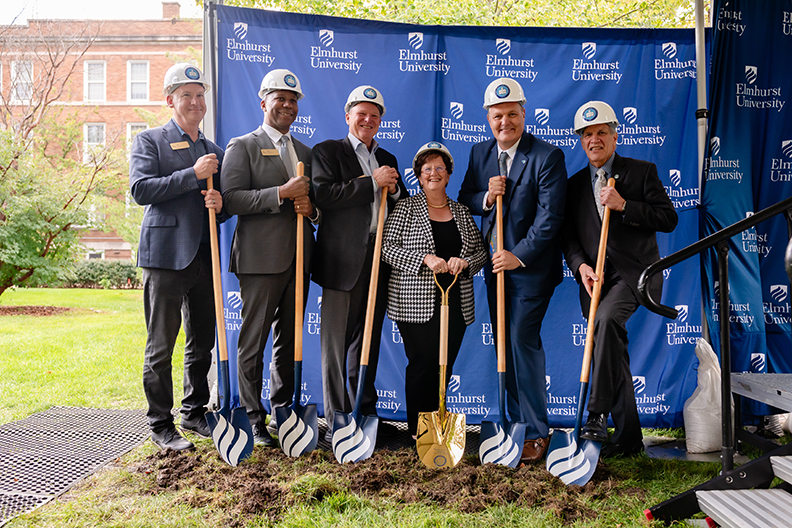 During a ceremony on Oct. 12 attended by a large crowd of Elmhurst University employees, trustees, students and community leaders, the University broke ground on a health sciences building that will become a multidisciplinary hub for learning and innovation.
During a ceremony on Oct. 12 attended by a large crowd of Elmhurst University employees, trustees, students and community leaders, the University broke ground on a health sciences building that will become a multidisciplinary hub for learning and innovation.
Hugh McLean, chair of the Elmhurst University Board of Trustees, opened the event by recalling that a similar gathering hadn’t taken place since 2008, when the West Hall residence hall was completed.
“For the last 15 years, we’ve been waiting for another opportunity to break ground and do great things,” he said.
Elmhurst Mayor Scott Levin congratulated the University, highlighting the close relationship that the City of Elmhurst and the University have enjoyed for decades, and “the prestige that this University brings to our city.”
“Health care is a leading industry in this country and in our economy,” he added. “The University has recognized this and invested heavily in health care services through their programs. This new health sciences building will add so much to the campus.”
Elmhurst University President Troy D. VanAken expressed gratitude to city officials for their collaboration, and also thanked University trustees and donors, faculty, administrators and staff for the “great teamwork, leadership and partnership across campus that has brought us to this day.”
“I’m so excited about this building, what it means for our current and future generations of students, as well as our faculty and rest of our University community,” he said.
The 45,000-square foot, state-of-the-art facility will be a hub for the nursing, public health, occupational therapy, and communication sciences and disorders programs. The new facility will house a simulation space and virtual reality lab, as well as a new speech-language-hearing clinic, classrooms, offices and labs. It also will also house the Jans Center for Veterans, a resource center for student veterans and students actively serving in the military.
Diane Salvador, dean of the School of Health Sciences, said the new building will benefit not only faculty and students, but also members of the broader community. For example, the new speech-hearing clinic will be more accessible to clients, and the larger space will enable more patients to be seen, as well as the opening of an interprofessional practice offering occupational therapy and nursing services.
“Most importantly, the new building will allow us to change the way faculty teach and students learn,” she said.
President VanAken agreed. “This building will be an ideal environment for collaboration and innovation,” he said. “And it will show the world how we’re continuing to prepare our students for success; and how they will one day contribute to improved health care for our communities.”
After the remarks, Dean Salvador, Mayor Levin, President VanAken and other University leaders donned hard hats, picked up shovels and dug into the damp ground as photographers captured the moment.
The $30 million facility is scheduled to be completed by the spring of 2025.